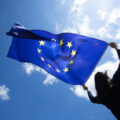Banning Muslims from European society?
Banning Muslims from European society?
Legal rulings are increasingly limiting the use of religious clothing and symbols in Europe. Our analyst Muhammad Faisal Khalil looks at how these rulings may also be stopping Muslims from taking part in public life.
This weekly comment was written by Muhammad Faisal Khalil and reflects his personal analyses and opinions, rather than those of EARS.
The European Union’s highest court, the Court of Justice of the European Union (CJEU), found on 15 July 2021 that employers can stop people from wearing religious clothing if there is “a genuine need” to “present a neutral image towards customers or to prevent social disputes.”[1] The ruling comes after two Muslim women in Germany filed cases against their employers dismissing them for wearing headscarves.[2]
Hurting Muslim women the most
While the CJEU insists that the ruling applies equally to all expression of religion or belief, Human Rights Watch believes that giving private employers the power to ban religious clothing hurts Muslim women the most.[3] These concerns are well-founded. Similar bans in Germany and France have previously forced Muslim women to choose between their faith and society. In Germany, for example, a ban on religious clothing and symbols for teachers and other civil servants forced some Muslim women to give up teaching careers.[4] Similarly, in France, school restrictions on headscarves kept a number of Muslim girls from finishing school.[5]
Muslims identity in the public
It can be argued, therefore, that instead of addressing the causes of discrimination against Muslim women, such bans rather risk further discrimination. Some Muslim intellectuals believe such rulings intentionally discriminate against Muslims. Jonathan A.C. Brown of Georgetown University reacted to the CJEU’s ruling by arguing that if Muslims “try to participate in society as Muslims, they find that in the end it’s about power and knowing your place. Act as “French” or “Austrian” as you can and pray you get by.”[6] He explains that such bans are trying to stop Muslims in Europe from existing as “fully-fledged, three-dimensional civic and political participants in their societies.”[7] In other words, anything that manifests Muslim identity in a public space is deemed unacceptable.
This concern for Muslim identity has also been raised by non-Muslim critics of the ruling. Polly Toynbee, a Guardian columnist and vice president of Humanists UK, for example, argues that the CJEU ruling violates the right of people to “express their religious identity – or lack of it – however they see fit.”[8] She further, and importantly, raises the point that this and other rulings violate the European convention on human rights, which proclaims freedom to manifest religious belief. To be sure, the CJEU reversed the German courts ruling, which had found the dismissal of the two Muslim women by their employers not only discriminatory but in contravention with their country’s constitution.[9] The consequence of these rulings may well be that Muslim citizens may not be able to participate in European society as Muslims.
Anti-Muslim racism?
Indeed, Maryam H’madoun of the Open Society Justice Initiative warns that the CJEU ruling will allow private employers to discriminate against and to sack Muslim women.[10] Moreover, she believes that this ruling will give more space to anti-Muslim racism, allowing prejudiced clients or staff to not let women in headscarves be hired in the first place.[11] Toynbee agrees with H’madoun’s assessment, calling the rulings “racism hiding under a veil of secularism.”[12] The result, H’madoun laments, is that “the more Muslim women try to take part in public life, the more rejection and hatred they face.”[13] In many ways, this ruling extends the sceptre of secular bans on publicly invisible religious practices to visible ones. German lawmakers, for example, passed a bill in 2021 to keep male infant circumcision legal after much outcry against a German court ban on male circumcision as grievous bodily harm.[14]
If some or most of what Brown, Toynbee, and H’madoun (and others like them) are saying is true, then it can be argued that Muslims in Europe are facing structural racism. Their participation in European society is being thwarted by discriminatory legislative efforts and attacks on protected freedoms. And these efforts and attacks are now particularly using “mundane shibboleths of dress and lifestyle”[15] to stop Muslim citizens from participating as Muslims.
This weekly comment was written by Muhammad Faisal Khalil and reflects his personal analyses and opinions, rather than those of EARS.
Interested in similar topics? Go to our Dashboard and receive free updates.
[1] A prohibition on wearing any visible form of expression of political, philosophical or religious beliefs in the workplace
[2] The European ruling on headscarves opens the way to rank discrimination | Polly Toynbee
[3] European Union Court OKs Bans on Religious Dress at Work
[4] European Union Court OKs Bans on Religious Dress at Work
[5] European Union Court OKs Bans on Religious Dress at Work
[8] The European ruling on headscarves opens the way to rank discrimination | Polly Toynbee
[9] The European ruling on headscarves opens the way to rank discrimination | Polly Toynbee
[10] Headscarf ruling puts a target on the backs of Muslim women | View
[11] Headscarf ruling puts a target on the backs of Muslim women | View
[12] The European ruling on headscarves opens the way to rank discrimination | Polly Toynbee
[13] Headscarf ruling puts a target on the backs of Muslim women | View






